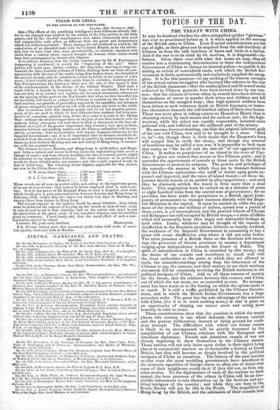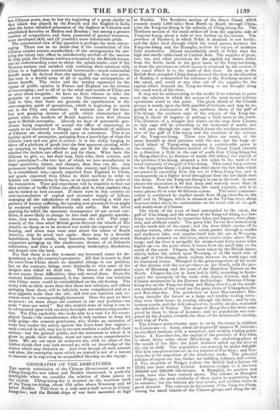TOPICS OF THE DAY.
THE TREATY WITH CHINA.
I may be doubted whether the often misapplied epithet " glorious" was ever so prostituted before as it is when applied to the success of the British arms in China. Even if moral considerations are left out of sight, as little glory can be acquired from the safe butchery of Chinese as from the safe butchery of bares and birds in a battue. And if the war is to be tried by its motives, it is disgraceful—in- famous. Gloss them over with what fair terms we may, they all resolve into a domineering determination to force the independent Government of China to change its internal police—to punish it for seizing an article of contraband trade, with which the British Go- vernment in India systematically and exclusively supplied the smug- glers. It is for this purpose—to say nothing of the wanton outrages of the armed opium-smugglers who hovered like vultures in the rear of the British armament—that the undisciplined and ill-armed mobs collected by Chinese generals have been mowed down by our can- non ; that the citizens of towns taken by assault have been driven in the madness of terror to murder their wives and children and kill themselves on the mangled heap ; that high-spirited soldiers have been driven to seek voluntary death on British bayonets, or immo- late themselves beneath the self-kindled rafters of their own homes. There was more glory in taking a purse on Hounslow Heath than in obtaining victory by such means and for such an end; for the high. wayman' while his object was equally respectable, incurred more personal risk, and inflicted not the millionth part of the misery. No success, however dazzling, can hide the original inherent guilt of the war with China, now said to be brought to a close. "Said to be"—for though there is little doubt that the Emperor's fears will compel him to ratify the treaty, and though any renewal of hostilities may be called a new war, it is impossible to look upon that treaty as "the be-all and the end-all" of our aggressions in China. It makes us proprietors of an island in the river of Can- ton; it gives our traders free access to five Chinese ports ; and it concedes the appointment of consuls at those ports by the British Government to protect its subjects. The powers and privileges of the consuls—the manner in which they are to transact business with the Chinese authorities—the tariff of duties upon goods ex- ported and imported, and the rates of inland transit—all these im- portant details remain to be settled by after-negotiation ; and until they be distinctly settled, the treaty is little more than a dead letter. This negotiation must be carried on at a distance of seven or eight hundred miles from the central seat of government ; for no provision has been made for permission to a British agent (tem- porary or permanent) to transact business directly with the Impe- rial Ministers in the capital. It must be carried on while the pay- ment of the twenty-one millions cf dollars, spread over a period of three years, is yet uncompleted, and the pawned islands of Chusan and Kolangsoo are still occupied by British troops,—a state of affairs which will necessarily keep alive angry and distrustful feelings on both sides. Lastly, whatever may be thought of the reports of disaffection in the Southern provinces, hitherto so hastily credited, the weakness of the Imperial Government in consenting to buy a peace will create disaffection even where it did not exist before. The mere presence of a British force on the frontiers will encou- rage the governors of distant provinces to assume a deportment verging upon independence towards the Court at Pekin. The spirit of subordination in China is unsettled by this treaty ; and the desire of our consuls and merchants to stand well with
the local authorities at the ports to which they are allowed to trade, the misunderstandings arising from the reluctance of the Chinese to pay the ransom, and their anxiety to see their territory evacuated, will be constantly involving the British residents in the political intrigues of China. Add to all these sources of anxiety for the future that the relations between this country and China, out of which die war arose, are as unsettled as ever. No arrange- ment has been made as to the footing on which the opium-trade is to stand. It is still a traffic prohibited by the Chinese Govern- ment, and in which the British Indian Government has a large pecuniary stake. The great but the sole advantage of the arniistice with China, (for it is in truth nothing more,) is that it gives us an opportunity of shaping our course anew and acting more honestly in time to come. These considerations show that the position in which the treaty places this country is one which demands the utmost caution and the gravest deliberation, instead of being ground for confi- dent triumph. The difficulties with which our future course is likely to be encompassed will be greatly increased by the complication of our Chinese relations with the European and American diplomacy. French and American vessels of war are already beginning to show themselves in the Chinese waters. Those nations will not only insist upon (what is their right) being Placed in commercial matters on as favourable a footing as Great Britain, but they will become as deeply involved in the political intrigues of China as ourselves. The history of the past teaches- us that even the most meddling governments have interfered in the domestic squabbles of foreign states as often out of dread that some of their neighbours would dcLit if they did not, as from any other motive. To the diplomatists of each of the nations we have named, the bare presence of the others in China will be an irre- sistible inducement to mix themselves up in the factions and po- litical intrigues of the country : and while they are busy in the South, Russia will not be idle in the North. The acquisition of Hong-kong by the British, and the admission of their consuls int() five Chinese ports, may be but the beginning of a game similar to that which was played by the French and the English in India after the latter obtained possession of the Jagbeer at Calcutta and established factories at Madras and Bombay; but among a greater number of competitors, and these possessed of greater resources, more developed skill, and (if possible) more indomitable pride.
The commercial view of the question is perhaps the most encou- raging- There can be no doubt that if the constitution of the Chinese empire remain nnenfeebled—if the arrangements for car- rying the treaty into effect be satisfactorily settled—if the ransom be duly paid, the Chinese territory evacuated by the British troops, and an understanding come to about the opium-trade—and if the Western nations rest satisfied with confining their relations with China to a legitimate commercial intercourse—much substantial benefit must be derived from the opening of the four new ports. But here is a fearful array of ifs to qualify our anticipations of future benefit. The views and the temper expressed by the organs of public opinion in France and England are the reverse of encouraging; and to all of us the mind and morals of China are an utter terra incognita : we have no facts whence to infer the probable or even possible course its Government may steer. Add to this, that there are grounds for apprehension in the over-sanguine spirit of speculation, which is beginning to speak out in the City and elsewhere. It reminds one of the base- less and grasping dreams of profit which characterized the period when the markets of South America were first thrown open to British enterprise. Already we hear of mercantile gen- tlemen being requested to accept the office of supercargo in vessels to be chartered to Ningpo, and the hundreds of millions of Chinese are already counted upon as customers. This is no healthy spirit of enterprise, springing from a knowledge of what the Chinese want and can give in return : it is the sickly longing to throw off a plethora of goods into the first apparent opening, with- out stopping to inquire whether they are fit for the market, or whether the dealers can afford to pay for them. What have the Chinese to give us, but their teas, their silks, their cottons, and their porcelains?—the two last of which we now manufacture in larger quantities, better, and cheaper, than they can do. Any permanent beneficial trade between this country and China must be a roundabout one,—goods exported from England to China, and goods exported from China to third markets in order to balance our transactions in them, or an inversion of this order of the transaction. Time and experience will be requisite to find out what articles of traffic China can afford, and in what markets they can be turned to best account. If there were in this country no over-accumulation of capital and excessive supply of labour, deranging all the calculations of trade and creating a wild im- patience of human suffering, the opening now presented to us might be rendered available deliberately and safely. But the blind yearning for relief, the necessary consequence of our actual con- dition, is more likely to plunge us into rash and gigantic specula- tions, that must, in many cases, increase the evil. The tragi- comedy of the time when British goods littered the wharfs of Rio Janeiro, so cheap as to be deemed not worth the expense of ware- housing, and when men went mad about the mines of South America, may be acted over again : there may be a feverish hopefulness, lavish credit, busy factories, banks, and joint-stock companies springing up like mushrooms, dreams of an Eldorado millennium, and then a crash, spreading bankruptcy, desolation, and despair over the land. Not that there is at this moment any increased cause for de- spondency as to the country's prospects. All that is meant is, that the news from China shows, no material change in our position, but, on the contrary, brings more distinctly to view some of the dangers into which we shall run. The terms of the armistice do not create these difficulties, they only reveal them. From the moment hostilities commenced, it was certain that our relations with China never could be reestablished on the old footing. The treaty tells us little more than that these new relations, and others springing from them, will be infinitely more complicated and on a more gigantic scale than the old; and that our wariness and ex- ertions must be correspondingly increased. Over the past we have no powr: we must shape our conduct to our new position—we mina " dree our weird." But this untried state of being is one to be adventured upon with resolute foresight, not unreasoning exulta- tion. The City capitalist, who looks only to a vent f,r his unem- ployed funds—the manufacturer, who is only anxious to keep his mills going—the country gentleman, who thinks an extension of trade may render the outcry against the Corn-laws less urgent— each centered in self, may see in the new markets a relief to all their anxiety : but the general public, and the statesmen to whom it is given to guide their destiny, must act upon more comprehensive views. We are out upon an unknown sea, with no chart of the hidden shoals that may lurk around us, with no knowledge of the storms which may threaten us. And even though all were smooth and clear, the enterprise upon which we started is not of a nature to warrant us in expecting an unqualified blessing on the voyage.



























 Previous page
Previous page